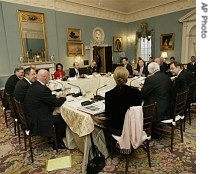2007年VOA标准英语-Mideast Quartet Partners Spar over Engaging Syr(在线收听)
State Department
02 February 2007
The international diplomatic "Quartet" on the Middle East Friday endorsed an upcoming three-way U.S., Palestinian and Israeli meeting aimed at reopening discussion of final-status issues of the peace process. But Quartet principals disagreed openly on the wisdom of direct dialogue with Syria and the radical Palestinian movement Hamas. VOA's David Gollust reports from the State Department.
 |
| Secretary of State Condoleezza Rice, back row in red suit, hosts meeting of the Mideast Quartet, at the State Department in Washington |
But there was open disagreement among the partners about the means to renew the stalled regional peace process, with Russian Foreign Minister Sergei Lavrov making clear his view that Syria should not be excluded from the dialogue.
The United States has shunned high-level contacts with Syria for nearly four years because of what U.S. officials say is its support for Palestinian radicals, including Hamas, and continued meddling in Lebanon, among other things.
But at a joint news conference capping the Quartet meeting, Lavrov defended Moscow's contacts with both Syria and Hamas, which the Quartet has excluded from peacemaking because of its refusal to accept Israel's right to exist.
Lavrov said Russian diplomacy with Syria helped produce a recent meeting between Palestinian Authority chief Mahmoud Abbas and the Syrian-based Hamas leader Khaled Meshaal, which in turn led to the recent intra-Palestinian truce accord.
Heard through an interpreter, Lavrov said, to exclude significant parties from Mideast peace efforts generally is counter-productive:
"When we're talking about not only the resolution of the Palestinian-Israeli conflict, but about the resolution of various problems in the Middle East, be it Lebanon, or Syria or the Iraqi problems, we believe that it is counter-productive to isolate anybody," he said. "And, we believe that to involve all those who could influence the situation is extremely necessary, so that this contribution or influence would be positive, not negative."
Rice defended the U.S. approach toward Syria, saying it had not cut off all contact with the Damascus government, which - she asserted - is in no doubt about what it needs to do to be a positive factor in the region:
"Syria doesn't need the United States to tell it what it could do to be a stabilizing force," she noted. "And I hope that [Syria] will, in fact, try to play a positive role rather than a negative one. The United States has diplomatic relations with Syria, has on many occasions talked to Syria, even at the highest levels. But we believe at this point in time that it is for Syria to act on what is a very obvious, what would be a very obvious path to help stabilize the region."
German Foreign Minister Frank-Walter Steinmeier, whose government currently holds the rotating EU presidency, seemed to take a middle ground. Steinmeier, who visited Damascus in December, said he had done so to directly convey to Syrian leaders European concerns about its behavior. He is also heard through an interpreter:
"We are working for a comprehensive peace solution in the Middle East, and that means we will have to engage other partners, beyond Israel and Palestine," he explained. "And I think, we share the view that Syria itself has to make it clear that it is willing to constructively engage in this peace process, and this is what I tried to impress upon the parties involved during my visit in Damascus."
Steinmeier said the Quartet partners agreed to convene again soon, after the Rice meeting with Mr. Abbas and Israeli Prime Minister Ehud Olmert, to be held sometime during the middle of this month at a still undisclosed Middle East venue.
The Quartet statement welcomed the Rice initiative, which it said could help define more clearly the "political horizon" for the Palestinian people, and help engender a sense of partnership between the parties.
Rice proposes to have an informal discussion with the two leaders on the so-called "final status" issues of the peace process, such as borders for a Palestinian state, refugees and the status of Jerusalem.
The Secretary says the talks, the first of their kind in six years, would complement but not replace the Quartet's road map to a two-state Middle East settlement, issued in 2003, but still largely unfulfilled.